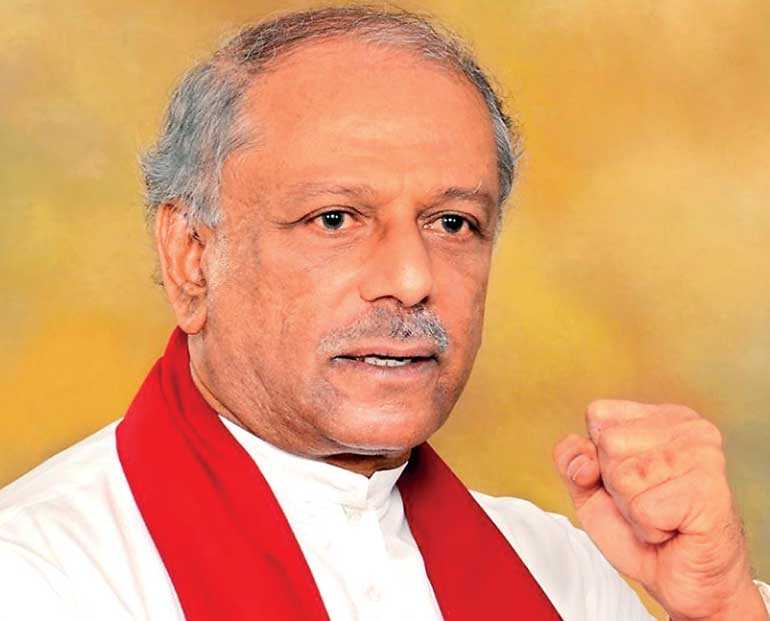Sunday Feb 22, 2026
Sunday Feb 22, 2026
Tuesday, 25 February 2020 00:00 - - {{hitsCtrl.values.hits}}

Foreign Minister Dinesh Gunawardane
Minister Dinesh Gunawardena is expected to unlock a casket full of suspicions and deal with a matter filled with confusion during his attendance at the UNHRC sessions this week.
Undoing is difficult when the doing has been wrong! But he has to face the music in demonstrating our interest as a country determined to project ourselves proactively in making the representatives understand our concerns, “in the interplay between national interest, international agreements and international law” and to lay bare the truth.
He is, we have no doubt, capable of firmly announcing our commitment to stay connected and being relevant to the rest of the world in the national interest, however, with no compromising of our sovereignty as a nation. We wish him well in the mission. 
The Council is a creation of the United Nations General Assembly on 15 March 2006 by resolution 60/251. The first session of the UNHRC took place in June 2006. This body has a periodic review mechanism providing for advice on human rights violations in the UN member countries and a procedure for complaints open to individuals and organisations to bring to the notice of the Council any human rights violations.
The Council has a membership of 47 nation states elected from among the UN general Assembly. In the Charter adopted by the member states in 2006, inter alia it was stated as follows; ‘that the work of the Council shall be guided by the principles of universality, impartiality, objectivity and non-selectivity, constructive international dialogue and cooperation, with a view to enhancing the promotion and protection of all human rights, civil, political, economic, social and cultural rights, including the right to development;’
The first concerns of human rights violations sprung as a legacy of the 30-year-old battle to control an internecine terrorist movement which had virtually ruined us all. It is no secret that pressure and influence of a powerful diaspora group initiated this inquiry process.
Soon after the political changes in 2015, the first resolution 30/1, co-sponsored by the recently elected National Government in October 2015 was adopted unanimously with the support of all member states of the HRC. It is noteworthy that the Sri Lanka Government had rejected many previous efforts by the HRC to intervene in the internal reconciliation process that was launched by the SL Govt. after the conclusion of the war. In all those instances there were divided opinions on the question of attempts by the HRC to engage in the internal affairs of Sri Lanka, among the member states of the Council. But due to the co-sponsorship the Council was led to adopt it without any divisions in October 2015.
The resolution dealt with “promoting reconciliation, accountability and human rights in Sri Lanka”. It was considered as an action plan of the SL Government with specific recommendations for improving the human rights situations consequent to the war. The alleged violation of human rights were attributed to both sides the armed forces as well as the terrorists who went on public rampages destroying both life and property.
Various proposals have been made termed ‘transitional justice’ under this implementation program for the Government in force to give effect to including items such as establishing an internal mechanisms to trace the alleged disappearances, a justice mechanism (with international support) to investigate war crimes and the returning of lands and other properties vested in the armed forces to their true owners.
The commission however in its report on the progress of implementation entrusted to the GOSL expressed grave dissatisfaction. The HRC has considered these findings as reasons for new developments such as ‘growing mistrust’ and the ‘risk of new violations’ due to the failure to deal with past ones.
The period of three-and-a-half years of administration of the national Good Governance Government was regarded as a period of ‘no concrete results’.
Adding to this distressing performance, other developments in the country led to the adoption of another resolution 34/1 in March 2017, exacerbating this view point of the HRC. Certain sporadic incidents involving Sinhala/Muslim clashes contributed to this state of affairs.
One important aspect for serious consideration in the context of the grievances associated with the war situation demanding resolutions were mostly related to matters such as returning of lands to the previous owners and the setting up of an office to deal with missing persons.
However there was serious disagreement on the question of establishing a mechanism with international involvement to deal with alleged war crimes.
President Sirisena took up the position that the matter of investigating into any criminal offences by the armed forces if any could and should be handled by the law enforcement authorities of the country with no involvement of any foreign assistance.
Resolution 40/1 has come up in this scenario.
The Easter Sunday massacre led by extremist fanatics gives a message to the world how the relaxed security situation has resulted in the calamity and at the same time how the communities living peacefully in the country tolerated the incident in harmony without the eruption of any communal or religious violations.
When we take a look at the events in the country in retrospect we see a grim picture of irresponsibility of the Government, impractical political promises and undertakings designed to woo the masses and some political leaders, unacceptable security relaxations, attempts to compromise majority views undermining the democracy to be the root cause for aggravating the international concerns.
The very act of co-sponsoring a foreign resolution without the proper sanctions of the country itself has contributed to deliver a wrong message to the member states who either remained neutral or opposed the stand of the HRC before.
Therefore Foreign Minister Dinesh Gunawardane has an unsparing task to set the record straight convincing the global partners about the mandate received by the new President from the people rejecting the so-called ‘Good Governance’ policies and his commitment to deliver justice to all without any difference.
There cannot be any contrary view for any state to endorse the difficulty for any democratically elected government to bind itself to a ‘time bound stifle’ in delivering what the people demand.